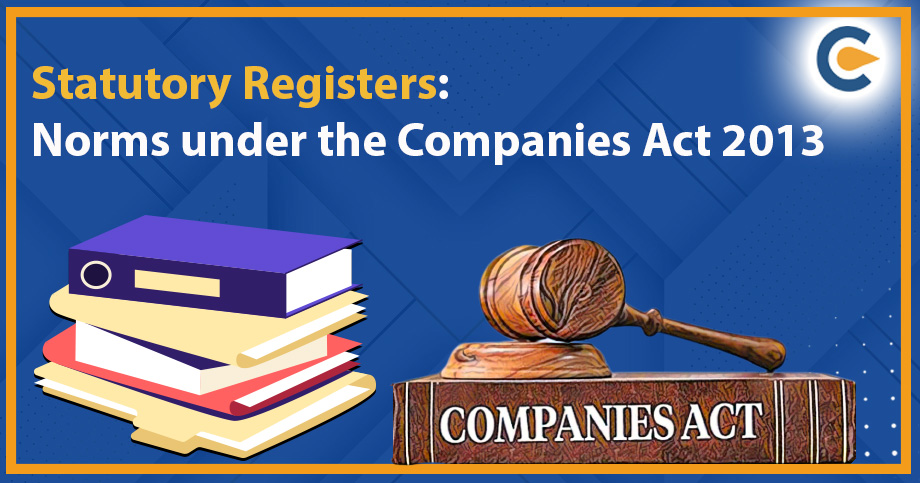Organization under the Companies Act 2013 deals with several documents and statutory registers. Their apt maintenance is an absolute mandate for such firms. The said legislation encloses various provisions relating to this subject matter. Improper maintenance of the statutory register can derail daily operations and incur penalties for non-compliance. The companies Act 2013[1] mandates every firm to ensure proper upkeep of the statuary registers, such as the book of accounts and financial statements, and keep them at their registered head office. The Act further requires companies to unveil and explain all the transactions which have affected the company or its branches in any way. Registers enclosing such transactions should be kept on an accrual basis.
What Do You Mean By Statuary Registers?
Statutory registers, as the name implies, are documents enclosing critical information about the company relating to its directors, members, key management personnel, etc. According to the Companies Act 2013, it is mandated for the companies to ensure proper upkeep of these registers. Any non-conformity in this context can trigger penalties for the defaulting firms.
Types of Documents That Are Considered Statutory Registers
The following are the vital document that are considered Statutory Registers:
- Members’ registers (MGT-1)
- Debenture holders’ register (MGT-2)
- Registers enclosing detail of Directors and KMP
- Foreign Registers (MGT-3)
- Register of duplicate or renewed share certificates (SH-2)
- Register of Sweat Equity Shares (SH-3)
- Register of charge (CHG-7)
- Register of shares & other securities buyback by the company (SH-10)
- Register of loan/security/guarantee/or securities’ acquisition (MBP-2)
- Register concerning the company’s register not held in its name (MBP-3)
- Register concerning the contracts and arrangements in which company’s director(s) have keen interest (MBP-4).
Information Enclosed In the Statuary Registers
Every firm accepting deposits must keep the register for deposits for 8 years. Such a duration will come into effect from the date entries were entered into such registers. Such registers must reflect the given details concerning the depositors;
- Name, addresses, and PAN concerning the depositors.
- For under-age depositors, parent information,
- Nominee’s details,
- Date and amount of each number
- Duration of such deposit;
- Interest rate;
- Repayable date;
- The due date concerning the interest payment
- date relating to interest due;
- Details concerning the deposit insurance
- Details concerning charge/security created;
- Other information relating to the deposit
All the entries being made to such registers must have the approval of the company’s directors or secretory.
Register of Members
Every company must ensure the proper maintenance of the following registers concerning the members;
- Registers of members having equity shares,
- Registers of members having preference shares,
- Register concerning the debenture holders
- Register concerning the security holders
Registers must reflect the name index. Furthermore, the member’s register (maintained by the company lacking share capital) must highlight the given information of each member:
- Name, address, contact mode, UIN, PAN, CIN, Nationality, Occupation, and Guardian information.
- Date of starting of membership
- Date of membership’s cessation
- Other information as required
Register Relating To Directors and KMP
The Companies Act 2013 mandates incorporated firms to maintain and keep the register at a place not other than the registered office. As the name suggests, such registers should highlight information about the company’s directors and KMPs. Besides, registers must show the information concerning the securities held by these officials in the company or its associated entity.
As per Rule 17, cited under the Companies (Appointment and Qualification of Directors) Rules, 2014, the given details must be included in the register.
- Director Identification Number (DIN)
- Name of the Director(s)
- Guardian’s details
- DOB
- Nationality
- Residential address
- The date on which resolution concerning the director’s appointment was passed
- Designation
- Date of office’s cessation and reasons thereof
Register of Charges
Form Number-CHG-7 is a format for maintaining a register of charges. Such statutory registers must enclose information about the charges registered with the registrar on property, assets, and companies. Further, it must also highlight;
- The particulars of property acquired and subjected to charges, Details concerning modification of any charge. Just like other statutory registers, the upkeep of such registers should be performed at the company’s registered office.
- The timespan for maintaining the instrument of charge creation is eight years. It will come into effect from the date of satisfaction of the charge.
Registers Relating To Renewed and Duplicate Share Certificates
Details of each share certificate issued against the consolidated or damaged certificate should be recorded in this register. Form SH 2 serves as the format for such statutory registers. The said format reflects the following particulars
- Details of the individual who received the certificate,
- Issuance date,
- No. of certificates in lieu of which the issuance of new certificates has been performed
- Required changes cited in the member’s register by apt cross-references in the “Remarks column”
While maintaining such registers, make sure to keep the given facts in mind:
The registers should be subjected to the permanent preservation and should be kept under the secretary’s custody or any other board-approved officials. All the entries must have the approval of the company’s secretary or other authorized officials.
Register Relating To the Employee Stock Options
As per the governing legislation, a company must use Form SH.06 to maintain the registers of Employee Stock Options. Such registers should enclose the particulars of an option granted. Companies must maintain and store such statutory registers at the registered office or a place approved by the BODs. The entries enclosed in this register must have the approval of the secretary or other board-approved official
Register Relating To Shares/Other Securities Buyback
As per the governing legislation, companies must use Form SH 10 for proper updation and maintenance of such registers. The mandatory inclusions to this register include;
- Date on which the special resolution concerning the buy-back of securities was passed
- Date on which the board’s approval came into effect.
- Number and price of securities or shares authorized for buyback
- Date on which buy-back offer came into effect
- Date on which the validity of the buyback offer came to an end
- Details of the shares or securities that were acquired under buy-back scheme
Conclusion
It is evident from the above that the statutory register encloses some of the critical information about the company which bolsters its legal existence. Maintenance of statutory registers cannot be performed through casual or volunteer acts. It is a legal requirement that stays in effect throughout the entire lifetime of the company.
Read Our Article: Types of companies under Companies Act, 2013











